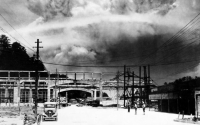Seth Freedman
When the first plane hit the World Trade Centre at lunchtime on September 11, 2001, the news caused nothing more than a brief stir in our trading room; when the second tower was struck, pandemonium ensued. While the rest of the world downed tools and gaped open-mouthed at the slaughter unfolding on their screens, traders in the world's bourses went into overdrive, frenziedly dealing on the back of the massive volatility that was sweeping global markets.
Cynical as it may seem, some of my friends from my City days still recall 9/11 as one of the greatest sessions of their trading lives; the day that they cleaned up in spades on the back of the misery and massacre of thousands of others. Anyone who shorted the indices (ie, sold stocks they didn't own in the correct expectation that they could buy them back more cheaply later on) made an absolute killing, capitalising on the fear and panic that swept through the markets and sent share prices crashing through the floor.
While there is a tendency among the self-righteous to criticise individual short-sellers who make money out of the misfortune of others, the fact is that those playing the stockmarket in such a fashion are merely a product of the system, rather than the catalyst behind the so-called evil. Once upon a time, stockmarkets were there to provide companies with a means to raise capital from investors; today's financial world is a vastly different beast.
Nowadays, there is as much incentive to kick a company while it's down as there is to support it when it is in ruder health; short sellers hover around a dying stock like vultures anticipating a feast, and every financial institution is as guilty as the next when it comes to gorging on the remains. Lehman Brothers' demise is a case in point, as too is AIG's seemingly impending collapse.
For every Sky News viewer watching in shock as Eamonn Holmes dumbs down AIG's plight with incessant reminders that it sponsors Manchester United, there are dozens of traders sitting pretty from their successful bear raid on the company. AIG shares lost over 60% in value yesterday, meaning that there were undoubtedly some very rich people made even richer by virtue of their having seen that AIG's end was nigh.
And so to Lehman Brothers, where thousands of employees were summarily dismissed over the weekend, prompting a wide range of responses from commentators on all sides of the political spectrum. Will Hutton's impassioned call for stringent government crackdowns on the way the markets operate highlighted the lack of sympathy he and many others have for those traders caught up in the Lehman meltdown.
In a way, it can be argued, many Lehmans traders were the architects of their own downfall. By being such major players in the derivatives market which, ultimately, has proved responsible for the credit crisis, they were signing their own death warrants. Not that they would have known it at the time, but once the first domino started falling last summer, the writing was on the wall; banks and hedge funds have been dropping like flies ever since, with little sign of an end to the epidemic.
On a parochial level, of course one should feel sorry for the individuals now out of a job, in the same way that sympathy should be extended to workers at XL, Alitalia, or at any of the other scores of companies falling victim to the credit crunch's malaise. However, as far as the bigger picture is concerned, when the hunter becomes the hunted – as with Lehmans, Bear Stearns, AIG, and so on – it is hard to elicit much compassion from those who have been on the receiving end of those companies' trading strategies in the past.
By definition, for every loser in the stock market there must be a winner, and City society does not deem it incumbent on the winner to share the loser's pain. This is true outside market circles as well; when British tourists were cheering sterling's strength a year ago, were they sparing any thought for the citizens of the countries whose currencies had collapsed against the pound? It's unlikely and, given human nature, it is wholly understandable too.
But if, as Hutton says, the name of the game should be about protecting companies, helping them develop and succeed, and avoiding financial calamities such as are unfolding today, then the markets need an injection of decency and morality as a matter of urgency. However, as anyone with any experience of the City knows, the chances of that happening are slimmer than AIG's hopes of survival. In the meantime, for every bull in its death throes, there is a bear laughing all the way to the bank.






